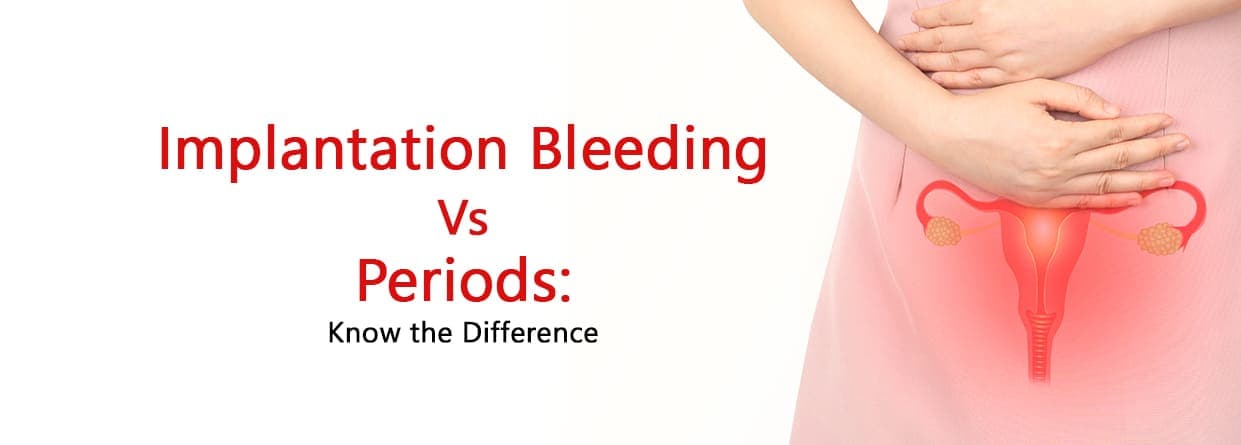
Confused about whether you’re experiencing implantation bleeding or your period? This blog helps you spot the key differences, so you can feel more confident about what’s happening—especially if you’re hoping to get pregnant or think you might be.
Have you ever found yourself in a situation where you're not quite sure whether the spotting you’re seeing is the beginning of your period or something more significant? For those trying to conceive, knowing the difference between implantation bleeding and a regular period can be really important.
While they can seem quite similar, there are subtle differences that might offer clues about your reproductive health as well as a possible early pregnancy.
Understanding these signs can help you avoid unnecessary stress. It also gives you confidence about when to take a pregnancy test. This blog gives you complete information about implantation bleeding vs. menstrual bleeding. If you're unsure or experiencing unusual symptoms, it's always a good idea to consult a Gynecologist for expert guidance and personalized care.
So, let’s get started.
Implantation bleeding happens when a fertilised egg attaches itself to the lining of the womb.
Not every woman has experienced it, but it's okay if you notice this. It can be one of the earliest signs of pregnancy. This spotting normally lasts just a few hours or up to a couple of days, and it’s much lighter than your usual period.
|
Feature |
Implantation bleeding |
Period (Menstrual Bleeding) |
|
Timing |
6–12 days after ovulation or conception |
12–16 days after ovulation (typical cycle: 28 days) |
|
Duration |
A few hours to 1–3 days |
3–7 days |
|
Flow |
Very light spotting |
Moderate to heavy flow |
|
Color |
Light pink, brown, or rust-colored |
Bright red to dark red |
|
Clotting |
No clots |
May include clots |
|
Cramping |
Mild or no cramping |
Moderate to strong cramping |
|
Consistency |
Spotty, not a continuous flow |
Continuous flow once it starts |
|
Associated Symptoms |
May include light cramping or nothing noticeable |
PMS symptoms like bloating, fatigue, mood swings |
|
Pregnancy Test Result |
May be positive if taken a few days later |
Negative (if not pregnant) |
|
Cause |
Fertilised egg attaching to uterine lining |
Shedding of uterine lining due to no fertilisation |
Here are some signs that could point to implantation bleeding:
Because implantation bleeding happens near when your period is due, it can be easy to mix up the two. Keep an eye on the colour, flow, and any symptoms you feel.
“Light spotting around the time of your expected period could be implantation bleeding, which is normal and not harmful. But if you experience heavy bleeding or severe pain, or if you think you might be pregnant, please see your doctor for evaluation.” — Dr. Archana Sinha, Consultant – Obstetrics and Gynaecology
Most implantation bleeding is harmless and normal. But speak to a healthcare professional if:
Your doctor can help figure out what’s going on and offer the right care.
Most women are confused and concerned about the difference between implantation bleeding and a period, especially when they think they may be pregnant. Although they may look similar, implantation bleeding is usually lighter, shorter, and pink or brown in colour. Periods are heavier and last longer. Knowing these differences can put your mind at ease and give you a better understanding of your body.
No, not everyone experiences implantation bleeding.
No, implantation bleeding typically does not have clots.
No, it is usually painless or causes only mild cramping.
Yes, because both involve bleeding, but implantation bleeding is much lighter and shorter.
No, implantation bleeding is generally normal and does not harm the pregnancy.
Stress does not cause implantation bleeding; it happens due to embryo implantation.
If bleeding is heavy, lasts more than a few days, or is accompanied by severe pain, consult a doctor.
Mild cramping, breast tenderness, fatigue, or no noticeable symptoms at all.
It usually appears as light pink or brown spotting.
It lasts from a few hours up to 1-3 days.
Written and Verified by:

Director & HOD Obstetrics & Gynecology Exp: 43 Yr
Obstetrics and Gynaecology
Dr. Bikash Banerjee is Director & HOD of Obstetrics & Gynaecology Dept. at CMRI, Kolkata with over 30 years of experience. He specializes in infertility & ART, laparoscopy & robotic gynaecological surgery, high-risk pregnancies, and complex gynaecological disorders.
Similar Obstetrics and Gynaecology Blogs
Book Your Appointment TODAY
© 2024 CMRI Kolkata. All Rights Reserved.